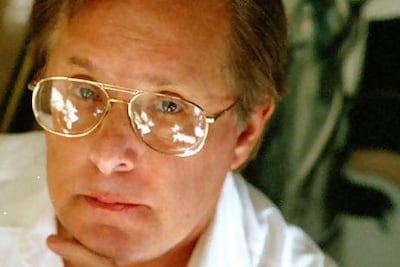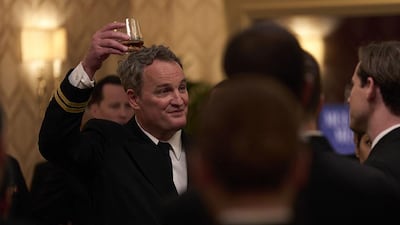Arriving out of competition at the Venice Film Festival, The Caine Mutiny Court-Martial is the final film by the great William Friedkin.
The revered director of The Exorcist and The French Connection died just a month ago, aged 87, and the film begins with a quotation from Friedkin, marking his passing, that says he’s always explored “the thin line” between good and evil in his films.
In his previous work, which premiered in Venice in 2017, he fronted the exorcism documentary The Devil and Father Amorth, a rather ham-fisted raking over of old ground. But The Caine Mutiny Court-Martial doesn’t feel like a filmmaker exhausted of ideas or the possibilities of cinema. Quite the reverse. Primarily set in one location – a wood-panelled military courtroom – Friedkin has gathered a terrific cast around him for this verbally dexterous drama.
The film is based on The Caine Mutiny, Herman Wouk’s 1952 Pulitzer-winning novel, which Wouk adapted for the stage. Inspired by Wouk’s time on a United States Navy destroyer-minesweeper in the Pacific, it famously became a 1954 movie with Humphrey Bogart, Fred MacMurray and Lee Marvin, directed by Edward Dmytryk. Among several key people who passed away during the development of this film, Wouk died in 2019, aged 103.
In Friedkin’s version, we learn that US Navy captain, Lt Commander Queeg (Kiefer Sutherland), was in command of the USS Caine, an Avenger-class mine countermeasure ship sailing in the Strait of Hormuz. When a cyclone hits, his panicked actions lead to him being relieved of his command by his first officer Lt Maryk (Jake Lacy), who is now the subject of the court martial, accused of mutiny. In US naval history, there has only been one mutiny in 248 years, we hear.
Defending Maryk is Lt Greenwald (Jason Clarke), while the equally formiddable Commander Challee (Monica Raymund) leads the prosecution. Sitting in judgment is Captain Luther Blakely, played by Lance Reddick, to whom the film is dedicated (Reddick, famed for his role in the John Wick series, died in March, aged 60, and here delivers one final great performance as he sternly assesses the evidence before him).

Likewise, Australian actor Clarke is on blistering form, his role recalling his recent work in Christopher Nolan’s Oppenheimer, when he played the man who cross-examines Cillian Murphy’s physicist during his security hearing. Here, however, he gradually discovers that all is not what it first appears with Maryk and the others on the USS Caine. Or as Blakely surmises: “This has been a strange and tragic trial.”
With Friedkin’s camera prowling around the courtroom, the film never feels staid, despite the solitary location. There are no flashbacks to events on the ship, which leaves us simply with reams of dialogue to process, ably delivered by all the cast. That may be too much for some, and the film can ultimately be seen as like watching a filmed stage play. But when you’ve got actors this good, including The Good Wife star Raymund, that’s no hardship.
Like Clarke with Oppenheimer, Kiefer Sutherland’s back catalogue also springs to mind. In this case, the classic Tom Cruise-Jack Nicholson courtroom drama A Few Good Men. Friedkin’s film doesn’t quite boast the fireworks that film let off, but the exchanges when Sutherland finally sits in the dock – or rather on a chair on a raised platform – are still to be relished. Is he mentally incapable of leading his men? His clean record, 21 years intact, would suggest otherwise. But he’s certainly not above tormenting the troops, it seems.
For Friedkin, The Caine Mutiny Court-Martial won’t outrank his greatest films, but it’s an impressive exercise in taut, concise storytelling, as he examines issues of power, loyalty and cowardice. It’s impossible for artists to fully control their destiny. But as he posthumously returns with one last statement, look at that “thin line” between good and evil, Friedkin has been able to put the icing on a true cinematic legacy.

